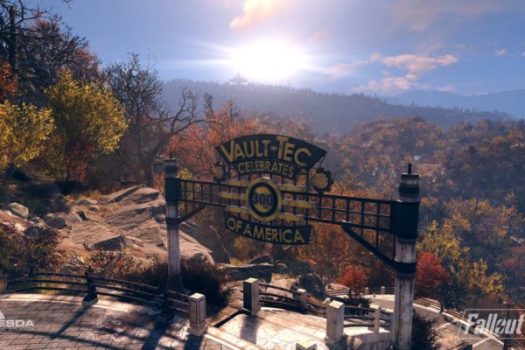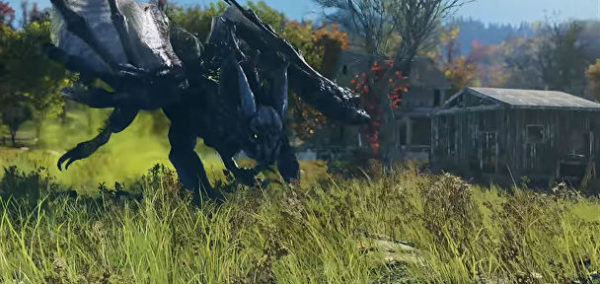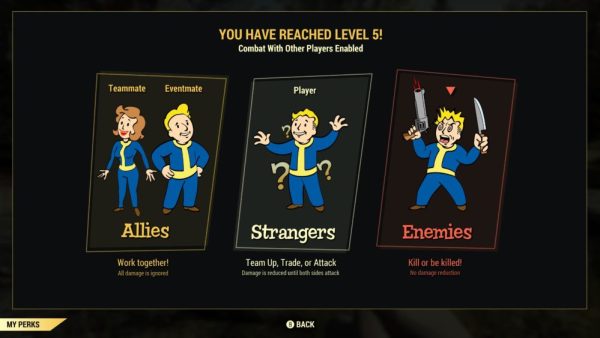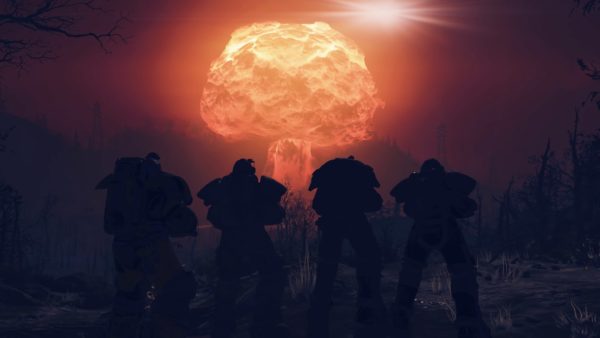Fallout 76 on PlayStation 4
Fallout 76 isn’t an inherently bad game. At times, it shows glimpses of what makes the Fallout series one of my personal favorites, as I wandered into its vast world, not knowing what I’d find within the tall skyscrapers of Charlestown or the swampy Mire in the east of the map.
But then you begin suffering from dehydration, contract Parasites (which do a number on your hunger gauge for up to 2 hours) from a diseased Stingwing that you couldn’t hit with the awkward combat controls, become overencumbered because you harvested its wings, along with everything else you’ve found on your adventure so you can repair your weapons and armor, and then just as you reach your C.A.M.P. to manage your carry weight, a pack of wolves spawn out of nowhere, surround you, and slowly chip away at your health until you die.
That was a legitimate experience I had in Fallout 76, and it was one that kept rearing its head in slightly different iterations. One time it was a pack of 12 Super Mutants, all of a higher level than me that randomly ambushed me in the middle of nowhere when just moments before there was no sign of any enemies nearby. Another time it was a pesky Mole Rat that proved too agile for Fallout 76’s wonky combat controls and my poor, overencumbered self
You see, the main problem Fallout 76 has, is it doesn’t really know what it wants to be. At times, it tries to deliver that narrative-driven Fallout experience fans have come to know and love. And at others, it tries to push the boat out in a new, exciting multiplayer direction. But it never commits to either of these things, and as such, feels lost in an uncomfortable middle ground that seldom satiates the desires of either single-player or multiplayer fans.
Fallout 76 doesn’t really have an epic story to unfold as you explore the post-apocalyptic wasteland of West Virginia, called Appalachia. You emerge from Vault 76, a fallout shelter built to keep the best and brightest minds in the country safe when the bombs dropped so you could emerge on Reclamation Day and rebuild.
Upon stepping out of your former underground home, you’re left to initially follow the footsteps of the vault’s Overseer, before being given more freedom to go out and uncover the stories of other dwellers who seemingly left Vault 76 way before you could even be bothered to get out of bed or know what was going on.
It’s just not as grabbing as the somewhat cliche stories that we followed in the likes of Fallout 4 or Fallout New Vegas. For the most part, you’re left trying to uncover more of the story by simply listening to Holotapes and picking up notes left around the world, but the whole things feels just too lonely. There are some redeeming moments along the way, with Rose the Raider robot being a particular standout side character you’ll encounter along the way. Though she is one of just a few you’ll actually meet. Her voice acting is spectacular, and her quests tend are some of the more enjoyable ones you’ll take on.

It’s clear, however, that the absence of human NPCs to interact with was intended to be filled by your fellow Vault 76 dwellers (read: other players), but there’s something immersion-breaking about having another player in an Uncle Sam outfit jump about in front of you while you’re sleeping on a bed trying to recover HP, not saying a word the entire time. And they certainly can’t do anything to spice up the monotony of the main questline, either.
For the most part, the main quests will send you out into the wasteland to go and find an item or kill a particular creature before returning back to the quest-giver or heading onto the next location hinted at within an entry on a Terminal or courtesy of one of the robots. What makes this particularly frustrating, however, is when Fallout 76 does its best to pad these out, sending you to a location on one side of the map, only to have you trudge back to the other to grab an item, only to head all the way back to your original location to drop it off or craft something new.
It’s sometimes possible to find these items out within the world closer by, but then you’re playing an RNG game in the hope that whatever item or creature you’re looking for just happens to spawn, or hasn’t already been killed by another player within the world. Things certainly pick up towards the latter stages of the main quest, but reaching that point has its own problems.
Ultimately, your enjoyment of the actual gameplay in Fallout 76 comes down a lot to whether or not the idea of seeking out junk materials, scrapping them, making more powerful weapons and armor, and heading out on your next quest sounds appealing to you. All while juggling the weight limit, thirst and hunger gauges of your character, and ensuring you’re ready to take on whatever the wasteland throws at you.
Arguably, it’s the design choice to place a limit on players’ stashes that feels at odds with the whole premise of the game, but with Bethesda already confirming this will be raised in an update in the near future, there’s a glimmer of hope this might become that little bit less tedious. That, and the fact that accessing your Pip-Boy and its many menus in real-time to manage your inventory, perks, or turn off random events or miscellaneous quests that instantly make themselves active isn’t ideal in a world where danger lurks around every corner.
Fallout 76 can be played solo, but for your own sanity, you probably shouldn’t. The entire thing feels like an arduous grind fest and one that isn’t tailored to solo players. Enemies take a stupid amount of hits to go down, the inventory limit on your Stash Box makes the scavenging and crafting elements of Fallout 76 feel like more of a chore than actual fun, and traipsing back and forth across Appalachia on your own while being bombarded by aforementioned bullet sponge enemies is no fun. Particularly when you’re just trying to complete a main quest and a level 50 Scorchbeast (a giant bat-dragon thing) spots you and relentlessly hunts you down until you’re dead. And yes, that’s level 50 no matter what level you are.

It’s a problem accentuated by Fallout 76’s heavy-feeling controls. Combat has never felt particularly fluid in past titles in the series, but with VATS now becoming some bizarre real-time auto-aim feature due to the game playing in real-time, you don’t really even have that to fall back on.
The plethora of creative and eccentric weapons available in Fallout 76 feels typically Fallout, but they’re just not as enjoyable nor as powerful-feeling as they should be. A missile straight to the face of a Super Mutant 12 levels lower than me, for example, only chipped off about a fifth of its health bar. What’s all that about?
Playing with friends relieved a lot of my problems with Fallout 76. Enemies rinsed my ammo reserves a little less in a simple skirmish, because I had some backup to help chip away at their health faster. I could fast travel to my teammates for free, rather than having to shell out Caps, and we could always trade items between our inventories in order to pick up a particularly valuable weapon or junk item without becoming overencumbered.
Fallout 76 never really leans into this enough to make me feel like it was worth interacting with other players outside of the friends I was playing with. Quests reward XP and a bout of consumables such as Stimpaks, Rad-Aways, water and food to satiate the ever-depleting gauges on your HUD, and due to the inventory limits, I gave up on trying to amass a nice arsenal of weaponry, instead limiting myself to only what was absolutely necessary. I’m sure some players will take pleasure in trading items with other players they find on their adventures, but it felt pointless and was something I tried once or twice and never used again promptly after that.
It was a similar story with the PvP elements. It’s clear that Bethesda didn’t want to alienate its hardcore fans intent on playing Fallout 76 as a single-player experience as much as they possibly could, but in placing restrictions on how PvP works, it may as well not be existent at all.
Random encounters with other players require both of you to shoot one another before any real damage is dealt. Choose to shoot one player point blank in the back of the head with a shotgun, and it’ll do a slither of damage until they return fire. At most, all you’re going to get for defeating another player in combat is some junk items and a nice ‘Wanted’ icon emblazoned above your head and on your location on the map.

Meanwhile, the Hunter/Hunted radio station attempts to get a proper PvP mode going in Fallout 76, but I never actually found enough other people tuned into the station for this to begin after over 50 hours exploring the world. Workshops, on the other hand, feel like a missed opportunity that could still bring some PvP magic to the wasteland if tweaked. With a wealth of valuable resources available here, players can claim these workshops, extract the resources, and fend off other players. Problem is, if you’re fending one off, players can just constantly respawn nearby with no repercussions for dying, and keep harassing you until either you die or give up.
And then there’s Fallout 76’s C.A.M.P. feature, allowing players to carve out their own home from home in Appalachia. The building system feels like it’s been torn right out of Fallout 4, but it’s hindered by the aforementioned inventory weight limits, not to mention it was never all that impressive or enjoyable to mess with in the first place. My camp ended up being a foundation of wooden panels so I had somewhere to place workbenches, a bed, my Stash Box and little else.
It never stayed in one place for too long either, due to either me choosing to move it as a mobile HQ for me to sort out my inventory, or because the game needed to move it as I’d dropped into another world where someone had theirs in a similar place. Just as it did in Fallout 4, though, I’m sure the C.A.M.P. system will resonate with some fans intent on making elaborate shelters in the most picturesque areas of the West Virginia wasteland.
As I said, though, Fallout 76 isn’t all bad. If you can get into the grind of constantly managing your inventory and Stash Box, seeking out the right junk items to scrap for those rare crafting materials, and deal with the hit-and-miss combat, it still has moments where it feels like Fallout. I’ll never get tired of exploring a post-apocalyptic wasteland to The Ink Spots’ ‘I Don’t Want to Set the World on Fire,’ especially when Bethesda does such an excellent job of making every building a potential treasure trove of exciting loot or interesting stories.
It’s possible to partially alleviate issues you have in Fallout 76 with the SPECIAL stats and Perk Cards systems, too. Perk Cards freshen up the skills system, allowing players to either have a number of low-level perk cards that provide a minor buff, or combining duplicate cards to create a ranked up card that takes up more perk points within that particular stat, but grants a more powerful version of the same buff. For example, you could have a level 1 Junk Rat card that reduces junk item weight by 10%, or you could combine three duplicates in order to create a level 3 card that reduces that weight by 25%, but it’d take up three slots within that stat, rather than one.

The fact that you can swap out your equipped Perk Cards whenever you want provides the freedom to experiment with character builds, rather than being locked into one. And while the Charisma stat now almost entirely revolves around co-operative play, the selection of Perk Cards on offer has something for just about everyone.
Appalachia’s world is actually one of the prettiest wastelands I’ve explored in a Fallout title. The sun seeping through the trees in The Mire as green gas settles below the canopy is a nice change from the usual greys and browns that typically make up most of the color palette in a Fallout title. Thoroughly exploring Appalachia is full of great sights to see, and stumbling upon the likes of Mothman or the Flatwoods Monster provide that same exciting sense of mystery to this wasteland that the series is so renowned for.
Unfortunately, as fans have come to expect, Fallout 76 is teeming with bugs. Enemies glided across the floor, otherwise unanimated popping rounds off. Other times invisible enemies would attack me while I couldn’t attack them, or were stuck in walls so that I could easily pick them off. Then there were the times my C.A.M.P. disappeared, or where the game crashed entirely, sending me back to the PS4 home screen. Not to mention the general slowdown issues that frequently cropped up, or the times where the game wouldn’t let me respawn anywhere at all after my carry weight was too high as it kicked me out of the power armor I had previously been in. I also came across some pretty dire instances of hit detection, too, but that was the least of my concerns during my adventures.
It hurts my heart to say, but Fallout 76 doesn’t deliver the multiplayer Fallout experience that it could have done. Forcibly pushing players together in order to tackle the later main quests isn’t the experience fans wanted, nor is a PvP system that requires consent before it really kicks off, regardless of where you are. The story often lacks direction due to a lack of human NPCs, and quests are often equally as dull and unvaried. Ultimately, your desire to launch nuclear bombs will determine how invested you are in Fallout 76’s end game segments, but they don’t mix up the gameplay loop enough to feel distinct from the hours you’ve poured in to reach that point.
The wasteland of West Virginia is a dangerous one, filled with interesting things to uncover off the beaten path and the potential to improve. But right now, it’s hard to recommend it to anyone outside of die-hard fans of the series.
Score: 2.5/5 – Poor
For more information on how we review games, check out Twinfinite’s review policy here.
